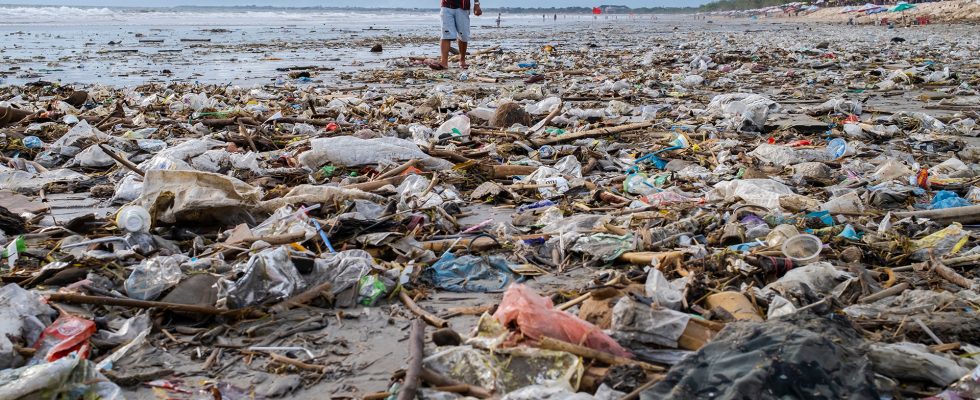Status: 04/16/2023 1:12 p.m
The G7 Environment Ministers have agreed on an earlier timetable in the fight against plastic waste. There are also ambitious plans for renewable energies – but in some cases without a concrete time frame.
The environment ministers of the G7 group want to end plastic pollution by 2040. They agreed on this after two days of consultations in Sapporo, Japan. With the decision, the G7 round goes one step further than before, because in 2019 the G20 countries had agreed on the end date of 2050. The G7’s exact plans for achieving the new goal have not been disclosed.
G7 climate ministers plan faster expansion of renewable energies
tagesschau24 1:00 p.m., April 16, 2023
“Cheap plastic in disposable products has become increasingly dominant in industrialized countries,” said Federal Environment Minister Steffi Lemke (Greens) in a statement. “It is therefore particularly important that the G7 now campaign for a quick end to plastic waste.” By the end of 2024, the legally binding agreement to reduce plastic waste should be completed.
Science estimates that between 4.8 and 12.7 million tons of plastic waste end up in the oceans each year. That’s roughly the equivalent of one truckload per minute. According to information from the environmental foundation WWF, more recent calculations – which include lakes, rivers and seas – even assume that 19 to 23 million tons of plastic waste end up in these ecosystems every year.
Concrete line for expansion of wind and solar energy
Another topic of the meeting was energy supply – here the ministers set themselves more ambitious goals for the expansion of renewable energy: For the first time, the G7 ministers set concrete goals for the expansion of solar energy and wind energy on the high seas, as the final document shows. According to this, around 150 gigawatts of offshore wind capacity are to be added by 2030, which corresponds to the capacity of 150 nuclear power plants. In addition, an additional 1000 gigawatts of photovoltaics are to be installed. Germany has already decided to build around 150 gigawatts of solar and 22 gigawatts of offshore capacity by 2030.
No timeline for phasing out coal-fired power plants
G7 ministers pledged to accelerate the phase-out of fossil fuels, but did not set a timeline for phasing out coal-fired power plants at the conclusion of two-day talks in Sapporo. In light of the current global energy crisis and economic dislocation, “we reaffirm our commitment to accelerate the clean energy transition to achieve net-zero greenhouse gas emissions by 2050 at the latest,” the meeting’s 36-page closing statement said. Ministers acknowledged the importance of finding efficient, affordable and diverse sources of energy, underscoring the “commitment to implement immediate, short- and medium-term actions in this critical decade.”
A timeline for phasing out coal-fired power plants has long been a matter of debate. Japan, for example, relies on coal for almost a third of its electricity generation and is also promoting the use of so-called clean coal, which uses carbon capture technologies to produce hydrogen, which when used as a fuel produces only water. The published document reiterates the need to urgently reduce carbon emissions and achieve a “largely decarbonized energy sector” by 2035. The phrase “predominantly” leaves room for continued use of fossil fuels. Ministers agreed, however, that priority should be given to phasing out “unabated” coal-fired power generation – that is, power plants that do not employ mechanisms to capture emissions to prevent them from escaping into the atmosphere.
The G7, an informal association of the seven leading industrialized countries in the West, accounts for 40 percent of global economic activity and a quarter of global carbon emissions. In addition to Germany, the G7 also includes France, Italy, Japan, Canada, the USA and Great Britain. Japan holds the G7 presidency this year.

